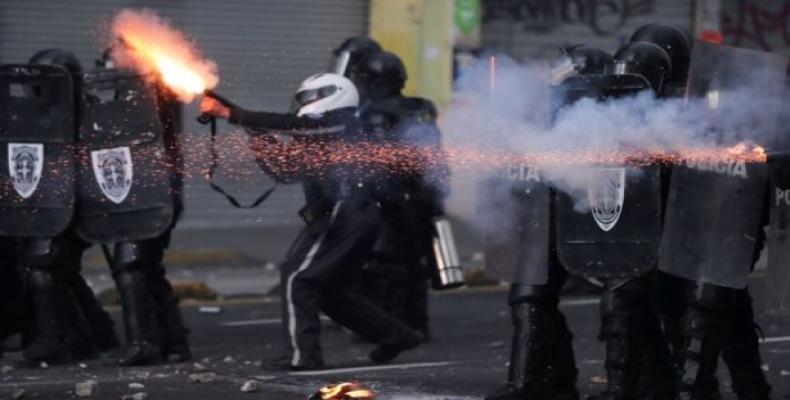Quito, October 13 (RHC)-- The Ecuadorean government under President Lenin Moreno has handed over all security controls across the country to the military and National Police until 3:00 p.m. Sunday. At that time, the state security forces or the president can decide for how long the national state of exception will last.
The president's Decree 893 hands over the status of the existing national State of Exception to the military. The military responded by limiting people's mobility across the country starting at 3:00 p.m. Saturday in “all sensitive and important areas” for 24 hours, or for however long the State of Exception lasts. Previously, the national curfew had been in force between 8:00 p.m. and 5:00 a.m.
In a statement released Saturday afternoon, the military said it was prohibiting people’s movement in all parts of the country in "sensitive" sectors, including airports and ports, oil refineries, police and military bases, energy and electrical bases, and water reservoirs until Sunday at 3:00 p.m., or until further notice. The military also added that "public spaces" would also be restricted.
With the military mandate, Quito's international airport announced it would ground flights indefinately and authories there have asked that all travelers planning to fly, to not go to their airport and for all of those within the airport to remain there while mobility is restricted.
The government’s intense restrictions on the public’s ability to move about the Ecuadorean territory comes as massive protests over the past week intensified in the capital of Quito on Saturday.
The protests, which had been organized mainly by the Ecuadorean Confederation of Indigenous Nationalities (Conaie) and localized around the National Assembly and historic center, on Oct. 12 spread to all parts of the capital city, from poor and popular neighborhoods to more affluent sectors that don’t generally see anti-government protests.
All along Avenida Amazonas that stretches several kilometers of the city, from north to south, a women’s march was held, also against the controversial decree 883 that put into effect austerity measures and a fuel subsidy elimination as part of an International Monetary Fund (IMF) loan agreement that went into effect last week.
Earlier in the day, the Conaie, which has promoted peaceful protests, reiterated that it would dialogue with the government. However, an hour later, the capital was placed under curfew and was “militarized” the entire city to "facilitate the use of public force in the face of intolerable excess of violence."
The vast majority of the violence that has taken place in the capital and across the country over the past 10 days has been at the hands of the military and National Police that have both used tear gas bombs and live ammunition against peaceful protesters. Demonstrators are demanding the elimination of Decree 883 and for Moreno and his interior minister to step down.
Over 1,000 people have been arrested across the country, 76 percent of which have been released because no charges "whatsoever" could be produced against them, according to the nation's watchdog agency, The People's Defense.
It has also been announced that representatives of the Ecuadorean Confederation of Indignenous Nationalities will meet at 3 p.m. local time on Sunday with the Lenin Moreno administration to discuss the fuel price hikes and other austerity measures.


